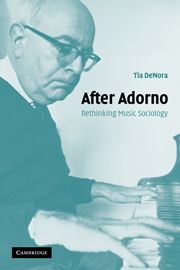Book contents
- Frontmatter
- Contents
- List of figures
- List of music examples
- Preface: a two part invention
- Acknowledgements
- A note on background reading
- 1 Adorno, ‘defended against his devotees’?
- 2 New methods and classic concerns
- 3 Music as cognition
- 4 How does music ‘channel’ emotion?
- 5 Music and ‘control’
- 6 After Adorno: rethinking music sociology
- Bibliography
- Index
4 - How does music ‘channel’ emotion?
Published online by Cambridge University Press: 22 September 2009
- Frontmatter
- Contents
- List of figures
- List of music examples
- Preface: a two part invention
- Acknowledgements
- A note on background reading
- 1 Adorno, ‘defended against his devotees’?
- 2 New methods and classic concerns
- 3 Music as cognition
- 4 How does music ‘channel’ emotion?
- 5 Music and ‘control’
- 6 After Adorno: rethinking music sociology
- Bibliography
- Index
Summary
Of all the arts, music is most typically associated with emotional experience. Claims within both the scholarly community and in everyday life on behalf of music's capacity to express and induce emotion in its listeners themselves testify to the idea of music as an emotional medium. In modern societies as in Bach's day, music is strongly associated with mood, feeling, emotion, and subjectivity.
Music's temporal feature – its unfolding over time – is often identified as the key to music's ‘emotional’ powers; unlike the plastic arts that portray nature and actors in arrested motion, music moves through time. Like the form of the novel, then, music can convey the mercurial dimension of emotional experience, the process of feeling. But unlike literature (though like theatre), music is a medium that unfolds across socially shared time. All actors involved in a particular music-producing and music-listening situation are involved for the same amount of time and are exposed to (or produce) the same ‘parts’ of music at the same time. This is so even for aleatoric or improvised music – even for a work such as 4′33″ (John Cage's ‘silent’ piece), which still positions listeners together within a time frame, one within which sounds happen.
Compared to theatre, moreover, music does something unique. It is (unless it involves text or libretto) non-verbal.
- Type
- Chapter
- Information
- After AdornoRethinking Music Sociology, pp. 83 - 117Publisher: Cambridge University PressPrint publication year: 2003

